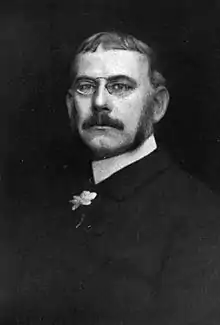Harry Thurston Peck
Harry Thurston Peck (November 24, 1856 – March 23, 1914) was an American classical scholar, author, editor, and critic.

Biography
Peck was born in Stamford, Connecticut. He was educated in private schools and at Columbia College, graduating in 1881, where his literary gifts attracted wide attention. His address at the conclusion of that year's commencement exercises was "witty, pathetic, and full of clever allusions" according to the New York Times. "Bouquets fell at his feet by the score as he bowed his way off the stage." [1] Upon graduation, he immediately joined the faculty as a Latin tutor, becoming a professor in 1888.[2] He was among several faculty members appointed to newly created chairs when he became Anthon Professor of Latin Language and Literature at the celebration of the 150th anniversary of Columbia's founding in 1904.[3]
Peck also wrote travel guides and produced translations and works for children under a number of pseudonyms, and he was a frequent and forceful contributor to magazines and newspapers. He was editor in chief of Harpers Dictionary of Classical Antiquities and editor of the Students' Series of Latin Classics and Columbia University Studies in Classical Philology. He served as the first editor in chief of The Bookman magazine, worked on its staff from 1895 to 1906, and created America's first best-seller list for its pages in 1895. He was also editor in chief of the International Cyclopaedia from 1890 to 1901 and co-editor of the first edition of the New International Encyclopedia (1902–1904).
In 1910, various newspapers reported that Peck was being sued by a former secretary for breach of promise of marriage. The stories included alleged excerpts from his love letters to her. The romance had purportedly occurred around the time that Peck divorced his first wife and married his second. The lawsuit was eventually dismissed and the facts of the dispute were never fully established. Columbia's president Nicholas Murray Butler was a long-time friend and former schoolmate of Peck's, but he promptly terminated Peck's relationship with Columbia based on the press reports. Peck fought his dismissal without success.[4] Various Columbia scholars tried to support Peck's right to more considerate treatment or due process, including Joel Spingarn—who was soon dismissed, as well.[5]
Peck lived out his remaining years cut off from his former colleagues and relying on income from occasional writing assignments. He was increasingly depressed and unable to find work, and was seen one day near the end of his life on the streets of Manhattan "walking in a dazed sort of way" and "entirely oblivious to his surroundings."[6] He committed suicide in Stamford, Connecticut on March 23, 1914[7] and was buried in Christ Church Cemetery in Greenwich, Connecticut.[8]
Works (partial list)
Classical
| Wikisource has original works written by or about: Harry Thurston Peck |
- The Semitic Theory of Creation (1886)
- Latin Pronunciation: A Short Exposition of the Roman Method (1890)
- Suetonius (1889)
- Roman Life in Latin Prose and Verse: Illustrative Readings from Latin Literature (1894)
- International Library of Masterpieces, Literature, Art and Rare Manuscripts (1901)
- A History of Classical Philology from the Seventh Century BC to the Twentieth Century AD (1911)
Edited works
- Harper's Dictionary of Classical Literature and Antiquities
- The International Cyclopedia (1890–1901)
Children's stories
- The Adventures of Mabel (1889)
- Hilda and the Wishes
Essays
- The Personal Equation (1899)
- What is Good English? and Other Essays (1899)
- The New Baedeker: Being Casual Notes of an Irresponsible Traveler (1910)
Other
- William Hickling Prescott (1905)
- Twenty Years of the Republic, 1885–1905 (1906)
- Studies in Several Literatures (1909)
Poetry
- Greystone and Porphyry (1899)
Translation
- Trimalchio's Dinner (1898)
References
- COLUMBIA'S CLASS OF '81; CONFERRING DEGREES IN THE ACADEMY OF MUSIC, New York Times, June 9, 1881
- PROF. HARRY THURSTON PECK, New York Times, Nov. 6, 1888
- COLUMBIA CELEBRATES HER 150TH BIRTHDAY, New York Times, Nov. 1, 1904
- COLUMBIA TRUSTEES REMOVE PROF. PECK, New York Times, Oct. 5, 1910
- Michael, Rosenthal, Nicholas Miraculous: The Amazing Career of the Redoubtable Dr. Nicholas Murray Butler (NY: Farrar, Straus and Giroux, 2006), 198–210
- James Weldon Johnson, Along This Way: the Autobiography of James Weldon Johnson (NY, 1933) 193
- PROF. H.T. PECK, ILL, COMMITS SUICIDE, New York Times, March 24, 1914
- PROF. PECK BURIED, New York Times, March 16, 1914
External links
- Harry Thurston Peck at the Database of Classical Scholars
- Works by Harry Thurston Peck at Project Gutenberg
- Works by or about Harry Thurston Peck at Internet Archive
- Works by Harry Thurston Peck at LibriVox (public domain audiobooks)

- Finding aid to Harry Thurston Peck papers at Columbia University. Rare Book & Manuscript Library.